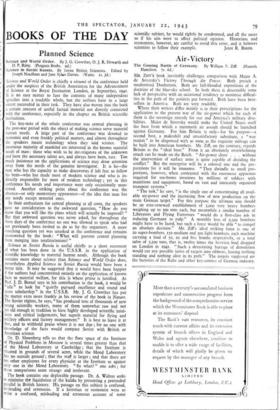BOOKS OF THE DAY
Planned Science
Science and World Order. By J. G. Crowther, 0. J. R. Howarth and D. P. Riley. (Penguin Books. 9d.)
Science in Soviet Russia. By Seven British Scientists. Edited by Joseph Needham and Jane Sykes Davies. (Watts. is. 3d.) Science and World Order is chiefly a resume of the conference held under the auspices of the British Association for the Advancement of Science at the Royal Institution. London, in September, 1941.
It is no easy matter to fuse the contents of many independent speeches into a readable whole, but the authors have to a large extent succeeded in their task. They have also woven into the book a certain amount of useful factual material not directly connected with the conference, especially in the chapter on British scientific institutions.
The key-note of the whole conference was central planning in the post-war period with the object of making science serve material human needs. A large part of the conference was devoted to economic and even frankly political matters, and almost throughout the speakers meant technology when they said science. The enormous majority of mankind are interested in the known material needs of man: those who wish to be investigators of the unknown and have the necessary talent are, and always have been, rare. Too much insistence on the applications of science may draw attention
away from the needs of the genuine investigator. It is he—the man who has the capacity to make discoveries if left free to follow
his bent—who has made most of modern science and who is in- directly responsible for most of modem technology ; yet in this conference his needs and importance were only occasionally men- tioned. Another striking point about the conference was the absence—or only momentary appearance—of the idea that man has any needs except material ones.
In their enthusiasm for central planning at all costs, the speakers lave no consideration to the awkward question, " How do you
know that you will like the plans which will actually be imposed? "
But that awkward question was never asked, for throughout the three days of the conference no one was allowed to speak who had
not previously been invited to do so by the organisers. A more searching question yet was unasked at the conference and remains unanswered by the book: "What will prevent central planning from merging into totalitarianism? "
Science in Soviet Russia is useful chiefly as a short statement of what has been done in the U.S.S.R. in the application of
scientific knowledge to material human needs. Although the book
contains more about science than Science and World Order does, nevertheless Applied Science in Soviet Russia would have been a better title. It may be suggested that it would have been happier if the authors had concentrated entirely on the application of known facts to material welfare, for this is where praise is justified. As Prof. J. D. Bernal says in his contribution to the book, it would be
"idle " to look for "quietly pursued excellence and sound and acute scholarship" in the U.S.S.R. Mr. J. G. Crowther has put
the matter even more frankly in his review of the book in Nature. The Soviet regime, he says, "has produced tens of thousands of new young scientific workers, many of them somewhat raw and not yet old enough in tradition to have highly developed scientific intui- tions and critical judgements, but superb material for flying and artillery officers and factory management." It is best to leave it at that, and to withhold praise where it is not due ; for no one with knowledge of the facts would compare Soviet with British or American science.
Dr. D. Shoenberg tells us that the floor space of the Institute of Physical Problems in Moscow is several times greater than that of the Mond Laboratory at Cambridge ; that the Institute is situated in grounds of several acres, while the Mond Laboratory has no outside ground ; that the staff is larger ; and that there are
ten other employees for every physicist at the Institute as against only one in the Mond Laboratory. "So what? " one asks ; for these comparisons seem strange and irrelevant.
The book contains one deplorable passage. Dr. A. Walton seeks to minimise the liquidation of- the kulaks by presenting a pretended Parallel in British history. His passage on this subject is confused, misleading and erroneous. If a historian or economist were to write a confused, misleading and erroneous account of some
scientific subject, he would rightly be condemned, and all the more so if his aim were to affect political opinion. Historians and economists, however, are careful to avoid this error, and it behoves


























 Previous page
Previous page